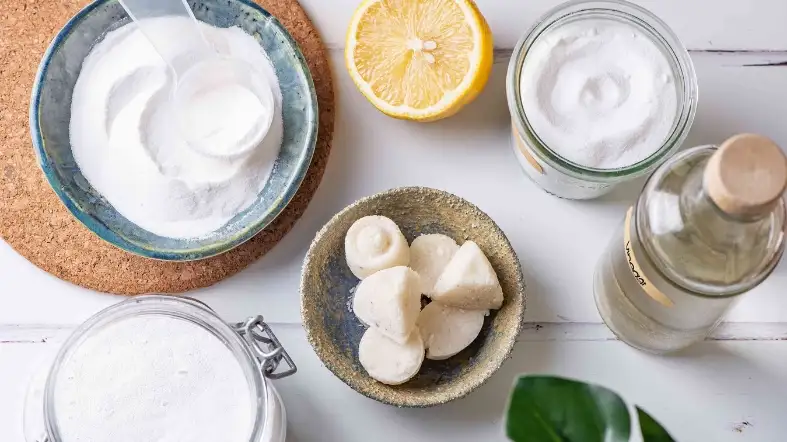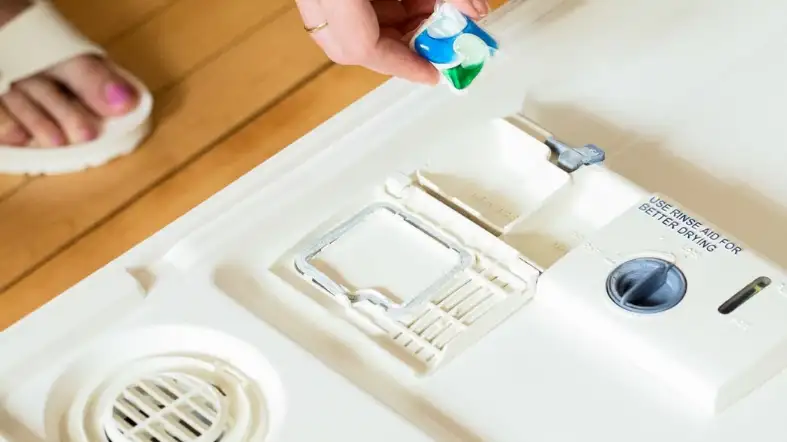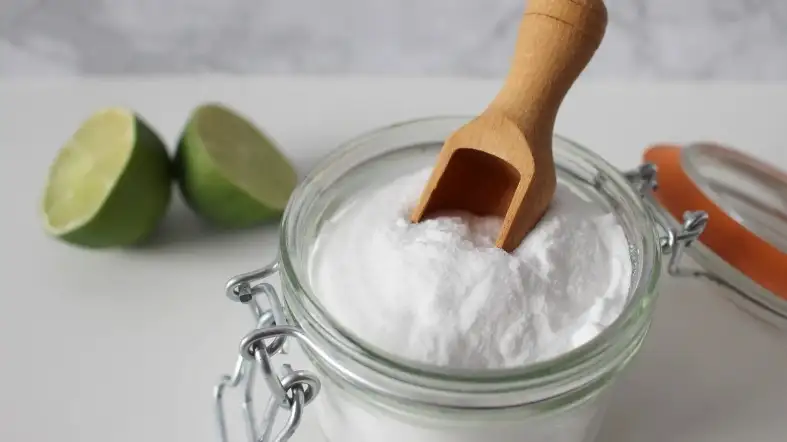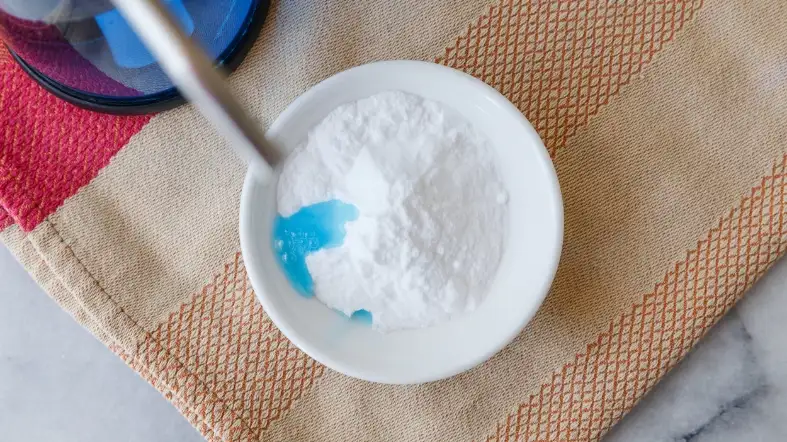Dishwashers have become an essential appliance in modern-day households, making dishwashing a breeze.
Running out of dishwasher detergent is frustrating if you prefer to use natural ingredients and don’t have baking soda on hand.
Luckily, there are several substitutes for dishwasher detergent that you can use to get your dishes sparkling clean without baking soda.
In this blog post, we’ll explore the substitute for dishwasher detergent without baking soda.
substitute for dishwasher detergent without baking soda
There are a few options you can try to get your dishes clean.

Salt:
Table salt can help to soften water and prevent hard water buildup, which can leave spots on your dishes.
Add a tablespoon of table salt to your dishwasher’s detergent compartment. Add a small amount of liquid dish soap.
Use about 1-2 drops of dish soap, as too much soap can create too many suds and lead to a messy overflow.
Run the dishwasher as you normally would, and the salt and dish soap will work together to clean your dishes.
Citric acid:
Citric acid is a highly effective ingredient for cleaning dishes and removing stains. Add a tablespoon of citric acid to your dishwasher’s detergent compartment.
Along with the citric acid, add a small amount of liquid dish soap. Use about 1-2 drops of dish soap, as too much soap can create too many suds and lead to a messy overflow.
Run the dishwasher, and the citric acid and dish soap will work together to clean your dishes.
Borax:
Borax is a natural mineral that can help to boost the cleaning power of your dishwasher detergent.
You can find it in the laundry aisle of most grocery stores or online. Add a tablespoon of borax to your dishwasher’s detergent compartment.
Along with the borax, add a small amount of liquid dish soap. Use about 1-2 drops of dish soap, as too much soap can create too many suds and lead to a messy overflow.
The borax and dish soap will work together to clean your dishes.
Vinegar:
Vinegar is a great natural cleaner that can help to remove stains and odors from your dishes.
Fill your dishwasher’s rinse aid compartment with vinegar instead of commercial rinse aid. The vinegar will work to clean and deodorize your dishes.
The importance of using the right detergent for your dishwasher

Using the right detergent is crucial to ensure that your dishwasher cleans your dishes effectively and efficiently.
Here are some reasons regarding the use of the right detergent for your dishwasher:
Proper Cleaning:
Dishwasher detergents are specifically formulated to remove food particles and stains from dishes, glasses, and utensils.
Using the wrong detergent can result in dishes not being cleaned properly, leaving food particles and stains behind.
It can lead to the growth of harmful bacteria on your dishes.
Preventing Damage:
Using the wrong detergent can cause damage to your dishwasher’s internal components, such as the spray arms and pump.
Some detergents are too abrasive and can scratch the interior of your dishwasher, while others may contain chemicals that are harmful to the rubber seals and gaskets.
Using the wrong detergent can lead to costly repairs or even a replacement of your dishwasher.
Water Quality:
Water quality depends on where you live, and using the wrong detergent can exacerbate the issue.
Hard water causes mineral buildup on dishes and inside the dishwasher.
Detergents that are specifically designed for hard water contain special ingredients that help to prevent mineral buildup and leave dishes looking cleaner.
Environmentally Friendly:
Using a detergent for dishwashers is not only better for your dishwasher and dishes but also for the environment.
Dishwasher detergents dissolve quickly and completely, leaving little to no residue behind.
They are also formulated to be low-sudsing, as they use less water and are more energy-efficient.
Limitations of using baking soda in dishwasher detergent

While baking soda seems like a natural and cost-effective alternative to dishwasher detergent, its limitations make it an unreliable option for effective cleaning.
There are some limitations to using baking soda in dishwasher detergent.
Ineffectiveness in Cleaning
Baking soda alone cannot effectively clean dirty dishes. While it can remove mild stains, it is not designed to break down grease and grime.
Therefore, using baking soda as a substitute for dishwasher detergent may leave dishes with residue and spots.
Corrosive Nature
Baking soda is a mild abrasive and can be corrosive to certain materials. Using it as a dishwasher detergent can lead to damage to delicate surfaces such as glassware and fine china.
Repeated use can wear down the dishwasher’s rubber seals and other components, leading to potential leaks.
Residue Buildup
Using baking soda in place of dishwasher detergent can cause residue buildup in the dishwasher’s filter and spray arms.
This can lead to clogs and decrease the effectiveness of the dishwasher.
Inconsistent Results
Baking soda lacks the necessary enzymes and surfactants that are present in dishwasher detergents to effectively clean dishes.
As a result, the cleaning results may be inconsistent, leading to some dishes being cleaned while others remain dirty.
Increased Water Usage
Using baking soda in place of dishwasher detergent may require additional water usage to rinse off any remaining residue.
This can result in increased water bills and waste.
Tips for using substitutes for dishwasher detergent without baking soda

Here are some tips for using substitutes for dishwasher detergent without baking soda:
Use Vinegar and Citric Acid
Mixing equal parts of white vinegar and citric acid can create an effective cleaning solution for your dishwasher.
This combination can help remove stains, grease, and grime from your dishes.
Try Borax and Washing Soda
A mixture of borax and washing soda can also be an effective alternative to dishwasher detergent.
Mix 1 cup of borax and 1 cup of washing soda and use 1 tablespoon per load. This mixture can help remove tough stains and grease.
Use Dish Soap Sparingly
Dish soap must be used sparingly. Use only a few drops of dish soap, as too much can cause suds to overflow from the dishwasher.
Use Lemon Juice
Lemon juice can be a natural substitute for dishwasher detergent. Squeeze a lemon into a bowl and mix with a cup of water.
Use this mixture as a rinse aid to help remove spots and stains.
Avoid Using Powdered Laundry Detergent
While powdered laundry detergent seems like a viable substitute for dishwasher detergent, it can damage your dishwasher.
The high alkalinity of powdered laundry detergent can corrode your dishwasher’s rubber seals and other components, leading to potential leaks.
FAQs
Can I Use Regular Dish Soap Instead Of Dishwasher Detergent?
Yes, but it must be used sparingly. Too much dish soap can cause suds to overflow from the dishwasher.
Is It Safe To Use Powdered Laundry Detergent As A Substitute For Dishwasher Detergent?
No, powdered laundry detergent can be corrosive to your dishwasher’s rubber seals and other components, leading to potential leaks.
How Much Vinegar And Citric Acid Should I Use As A Substitute For Dishwasher Detergent?
Mix equal parts of white vinegar and citric acid to create a cleaning solution for your dishwasher.
The amount will depend, but a good starting point is 1/4 cup of each.
Can I Use Apple Cider Vinegar As A Substitute For White Vinegar?
While apple cider vinegar is used as a cleaning agent, stick with white vinegar as a substitute for dishwasher detergent.
Apple cider vinegar may leave behind a residue on your dishes.
Can I Use Baking Powder Instead Of Baking Soda As A Substitute For Dishwasher Detergent?
No, baking powder contains other ingredients besides baking soda, like cream of tartar, which is not suitable for use in a dishwasher.
Stick with substitutes that are specifically formulated for use in a dishwasher.
Can I Use These Substitutes For Dishwasher Detergent In Any Type Of Dishwasher?
These substitutes must be safe for use in most dishwashers, but always check the manufacturer’s recommendations.
Some high-end dishwashers may require a specific type of detergent to ensure optimal performance.
Will These Substitutes Damage My Dishwasher?
When used in moderation and according to the manufacturer’s recommendations, these substitutes should not damage your dishwasher.
Using too much of any cleaning agent can cause damage, so follow the instructions carefully.
Can I Mix These Substitutes With Regular Dishwasher Detergent?
While it may be tempting to mix substitutes with regular dishwasher detergent for added cleaning power, this is not recommended.
Mixing cleaning agents can be dangerous and may result in harmful chemical reactions.
Conclusion
There are several substitutes for a dishwasher detergent that can effectively clean your dishes without using baking soda.
You can use white vinegar, lemon juice, or borax as an alternative. These natural alternatives can break down grease and food particles on your dishes, leaving them clean and shiny.
These substitutes require a bit of experimentation to find the right combination that works for your dishwasher and cleaning.
